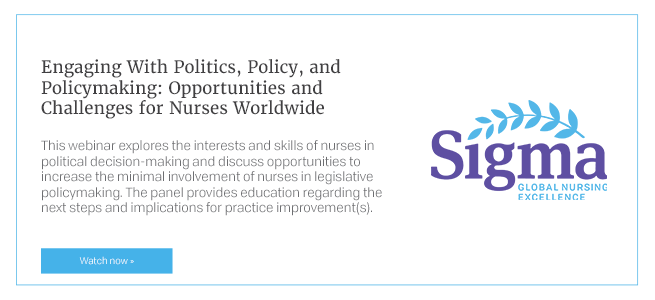To evolve the healthcare system to its fullest capacity, the nursing profession must advance beyond a vocational role. The future of the profession lies in part with raising awareness of nursing as unique and distinct from other professions and becoming a valued partner with other disciplines and actors in shaping and implementing healthcare policy. There is a knowledge deficit among society that rests squarely on an incomplete understanding of the profession, in part because nurses themselves may not consider themselves policymakers or thought leaders. Overall, the healthcare system lacks the perspective and input from nurses.
I worked in adolescent and adult psychiatric-mental health and correctional settings in various vocational roles for over 30 years before becoming a registered nurse in 2010. I read the Institute of Medicine’s report: The Future of Nursing: Leading Change, Advancing Health. As a novice nurse struggling to learn the craft, I simultaneously began contemplating one of the report’s recommendations that, “Nurses should be full partners, with physicians and other health professionals, in redesigning healthcare in the United States.” Activating this recommendation has been marginal at best with the Nurses on Boards Coalition reporting more than 10,000 nurses have stated being on a board of directors. Considering there are over 5 million RNs in the US, statistically, there are close to zero nurses engaged in policy making.
A few years ago, I read a thought-provoking article that described this role as a nurse policy entrepreneur. This stuck in my mind as a perfect depiction of how the power of the nursing profession can be applied to nudge the current form of healthcare towards something we can all be proud of. The notion of entrepreneurship is not a new idea and has been well received in the US because of people like Steve Jobs and Elon Musk. Expand that thought to policy entrepreneurship and you include Martin Luther King Jr. and Mahatma Gandhi as they influenced social policies of entire countries. Nurse policy entrepreneurship has been exemplified by the work of nurses like Florence Nightingale and Clara Barton who acted after seeing unmet needs.
In June 2022, I responded to a post on The Circle, Sigma’s online member community, from Enrique Castro-Sanchez asking if any nurses were interested in public policy related to healthcare. Sigma facilitated a brief online discussion. There was enough interest in the topic that Sigma set up a webinar titled Engaging With Politics, Policy, and Policymaking. Along with my colleagues Drs. Castro-Sanchez (London), Newman (San Diego), and Haghiri-Vijeh (Toronto), we presented a one-hour session to participants from 21 countries. It was clear that nurses throughout the world share a significant interest in their role as healthcare policymakers and reformers.
Despite an intense interest and often vocal criticism of the healthcare system, there did not appear to be an adequate means to support nurses if they desired to become part of the healthcare policy discussion. This is in part because of the IRS corporate structure of many nursing associations that prohibits political activity and focuses on educational content. I posted invitations on several nursing associations encouraging all nurses to have a chat regardless of experience, educational level, or specialty. Since August 2022, we have had nine consecutive monthly cafés.
The café format has been adapted for online use from the World Café method (TWC) that has been used with great success internationally for identifying community problems and solutions. Encouraging a spirit of curiosity and collective learning, the method stresses an environment that invites different opinions and perspectives as a way of discovering new insights. The World Café method always stresses the activation of creative cognitive functioning by encouraging the use of graphic notes as well as the typical concrete sequential format of traditional outline notetaking. The shared workboard/affinity diagram activity uses the Miro app which is available to all members simultaneously and at any time of the day. Team members have full access to a Google drive for shared documents, and we recently created a Slack collaboration and communication app for a discussion board related to the various project elements.
The first seven cafés were focused on identifying what a nurse policy entrepreneurship (NPE) might look like using an affinity diagram to thematically organize concepts. We distinguished about 200 concepts within seven themes, including where to act in the role; barriers; enhancers; types of advocacy; resources; definitions and terms; and personal professional development strategy. We also developed a Strength, Weakness, Opportunities, and Threats (SWOT) chart.
The last two cafés focused on developing an action plan. We decided on three projects: creating two levels of infographics to inform nurses on how to act in the NPE role; starting trial podcasts by interviewing nurses as they share their observed, actual, and potential experiences as an NPE; and drafting a briefing paper discussing our observations to inform nursing associations so they could support their membership in the role as NPEs.
The Nurse Policy Entrepreneur Café Project is a modest approach to supporting the profession in becoming a full partner with physicians, other disciplines, and in the political process of improving the quality of healthcare systems. The project is not affiliated with any organization and is not about specific issues but to support the nurse regardless of their hot button topic. Please feel free to join us or simply find out more about the project by contacting me directly.
Michael J. Polacek, DNP, RN, PMH-BC, NDP-BC, is retired and living in Panama, where he is partnering with Indigenous peoples to raise awareness of trauma science and community building. He is a member of Sigma’s Alpha Beta Alpha Chapter.
